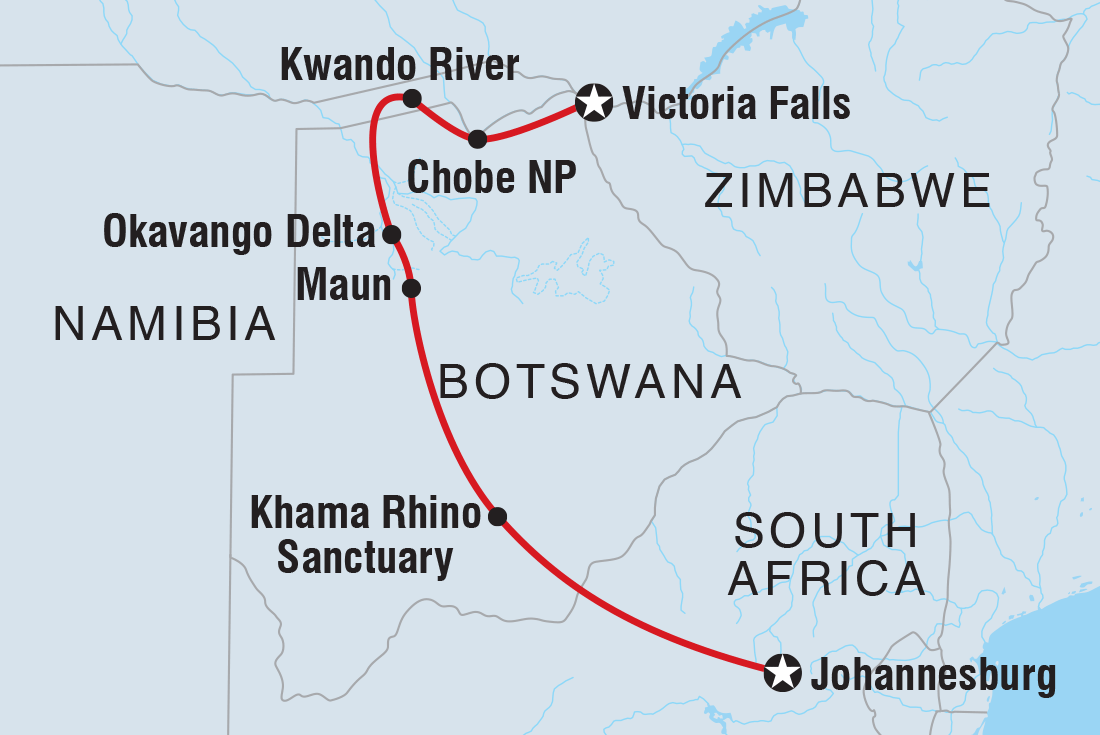
Time to break out your best Attenborough impression – you’re going on a safari. This trip doesn’t skimp on the savannah, but it mainly follows the rivers and watering holes that sustain life (human and wild) throughout Africa. Drive across the sands of the Kalahari Desert in search of rhinos, then spot elephants and warthogs while you cruise down the Okavango Delta in a dugout mokoro canoe. Camp on the floodplains of the Kwando River, and search for wildlife in Chobe National Park.
- Did you know that rhinos come out to play when the sun goes down? Let us prove it to you during a sunset 4WD through the Khama Rhino Sanctuary.
- Try and tell the difference between your buddy’s snores and the sound of wild hippos while camping in the heart of the Okavango wilderness.
- There's nothing more relaxing than feeling the African sun on your face as you lie back in a mokoro, eyes closed while your expert poler propels you through the Okavango Delta.
- Elephants never forget, and you won’t forget them either. Cruise down the river in Chobe National Park, home of the world's highest concentration of African elephants.
- Learn what life is like for the Hambukushu people, traditionally considered masters of fishing, boat building, and making it rain.
- Safari through Chobe National Park for a chance to see lions, elephants, zebras, impalas, wildebeest, giraffes, leopards, hyenas, jackals, warthogs, baboons, monkeys and much more
- By travelling on this trip, you’ll directly support our Intrepid Foundation partner, Victoria Falls Wildlife Trust. Donations help employ a team of Community Guardians who collaborate with locals to find sustainable solutions to human-wildlife conflict and conservation in Southern Africa.
- Accommodation on this trip is mainly in two-person canvas dome tents with camping mattresses supplied.
- The type and variety of accommodation are determined by conditions on each of our routes. Each route is different - on some, we use a mixture of campsites and wild camps; on others, we also use hotels. In Africa, it's not usually practical to camp when staying in towns and cities, so we use hotel accommodations and eat out in local restaurants.
- There may be the occasional night stop when we stay on the grounds of a hotel or at a campsite, which may also have rooms/cabins available. In this case, there may be a choice of camping or upgrading to a room. Rooms cost approximately USD 40-100 per room per night for a twin room and cannot be pre-booked. Standards of these rooms vary greatly, and we recommend viewing the room before purchasing the night's accommodation. The day-by-day itinerary advises when upgrades may be possible (subject to availability).
- Keep in mind that if we are staying in dormitory accommodation, you may have to share with other passengers or be split into same-sex rooms.
- Campsites do have facilities, but they usually aren't to the same standard you would find in Western countries. For example, the bathroom facilities can be very basic. Toilet paper is rarely provided, and shower facilities can be as simple as a hose pipe spurting out cold water. Wild camps have no facilities at all.
- At times, there may be spare tents in the vehicles. Unfortunately, these cannot be used without the purchase of a single supplement. This is to ensure the tents avoid wear and tear or are clean and ready for the customers arriving on the next section of the trip.